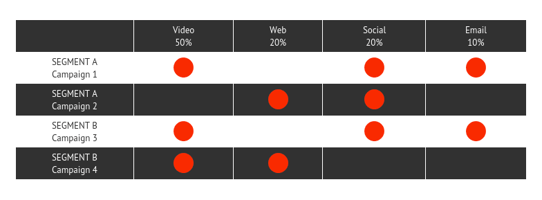At the upcoming ANA Joint Production Management and Advertising Financial Management, West Coast...
4 Reasons a Scope of Work System Is Crucial For Your Advertising Agency
Large advertisers need commercials, banner ads, and everything in between.
A scope of work is the crucial document that'll help the agencies you hire and your brand decide what type of advertising work is required and how much it will cost.
Too many times, our Decideware team meets advertisers that do not have a scope of work system in place. If that sounds familiar, you can likely relate to scattered Excel spreadsheets, tons of manual processes, and by the time you finish updating your spreadsheets, they're out of date.
Scope of work agreements are essential, and they can actually be fairly straightforward. Here are 5 reasons a scope of work system is so important for advertisers, agencies, and big brands.
1. Scope of Work Systems Increase Your Efficiency
Without a scope of work system in place, you're probably relying on a lot of manual work. Typically, what we see in most organizations is a scope of work generated in Excel.
The scope is then discussed back and forth, but the decisions may not be documented anywhere. There may not even be written approval, because everything is always done offline.
If you're a large advertiser working with many agencies, you're probably getting spreadsheets from all of the different agencies and brand teams, and you have to consolidate all the spreadsheets into a master file so that you can compare pricing.
By the time you get the files in order, they are probably out of date, and you're back to square one.
With an automated scope of work system, like the one we offer here at Decideware, all of the information in the scope of work is gathered into one place – in real time.

Now, for example, you can look at all of the rates in the creative category across all agencies – instantly.
Any time you can make a manual process automated, you're not only getting the efficiency gain, but you're also reducing the risk of manual error.
Another advantage is that an established process helps get scope of work documents approved more quickly so agencies can get started on projects in a timely manner.
2. Scope of Work Systems Standardize Your Data
One agency's scope of work calls commercials "TV commercials" and another one calls them "Television commercials."
It's the little nuances like this that make scope of work management so difficult for marketing procurement professionals.
According to Decideware's survey with World Federation of Advertisers, 61 percent of companies don't have a standard for executing scopes of work. This makes it difficult to compare and contrast what you're getting from each partner, and it's also difficult to determine whether or not you're maximizing the potential of these agreements.
When you have a system in place, like the one we offer here at Decideware, all of these titles and line items are standardized. That way, you can compare apples to apples between different agencies.
We now have a single line item for TV commercials, and we can see that Agency A charges $500,000, while Agency B charges $550,000. This is far easier than trying to reconcile several different spreadsheets that aren't using the same language.
When you standardize documents and processes across agencies – like making sure the Art Director is called Art Director in all scopes of work rather than say "Artistic Director" in one and something else in another – you can finally see things clearly.
It's so much easier to:
- generate reports,
- gain valuable insights, and
- determine where inconsistencies exist.
3. Scope of Work Systems Save You Money
While greater efficiency and standardization is powerful, the cost savings is what seals the deal for many marketing executives.

An automated scope of work system gathers information instantly, which means marketing professionals can go back to those agencies and instantly negotiate – and be accurate about their ask.
For example, you can call up Agency B and say, "You quoted us $550,000 for a commercial, but Agency A is at $500,000." You're accurate in your negotiations, and you're timely about it, because your scope of work system put all of that information in one place in real time.
With automation, you can more easily identify working capital. Pinpoint where the waste is so that it can be reinvested back into the business. If you're doing this manually, it can take weeks to identify something like that.
4. Scope of Work Systems Give Better Results
When dealing with a lot of variables, advertising projects, and brands, it's essential to streamline your process. We all want to get the most out of our agencies and our spending.
If you're a marketing procurement professional, you understand that it's not all about saving cash – it's about getting the most value for the business.
If you can track your scope of work more effectively, you can spend more time focusing on the important project details.

You can finally ask questions like:
- Are the most experiences staff members working on the most important deliverables?
- Are we using cheaper, but less senior team members on important projects?
- Are we spending too much money on experienced staff for simple projects?
With a scope of work system in place like the one we offer, you can maximize your results while also getting the added bonus of reducing costs.
Get Your Scope of Work System In Place!
Despite how complicated it can be to designate scopes of work for multiple agencies and vendors, many organizations still complete this process manually.
If you're using Excel and not documenting things properly, you're likely dealing with inconsistencies.
A software partner like Decideware can streamline scope of work activities and maintain all of the relevant data in one place.
By being able to view all of your data under one roof, you get tons of benefits, like:
- Increased workflow efficiencies
- Better accuracy and approvals
- Better cost analysis and money savings
- Analytics that improve your processes over time
- Improved outcomes
A proper scope of work system lets you maximize the potential of your agencies and partners by unlocking their true potential while curbing costs.
Other articles you might like:
For additional information on managing scopes of work or program development, click below or contact Robin Seasock at rseasock@decideware.com





